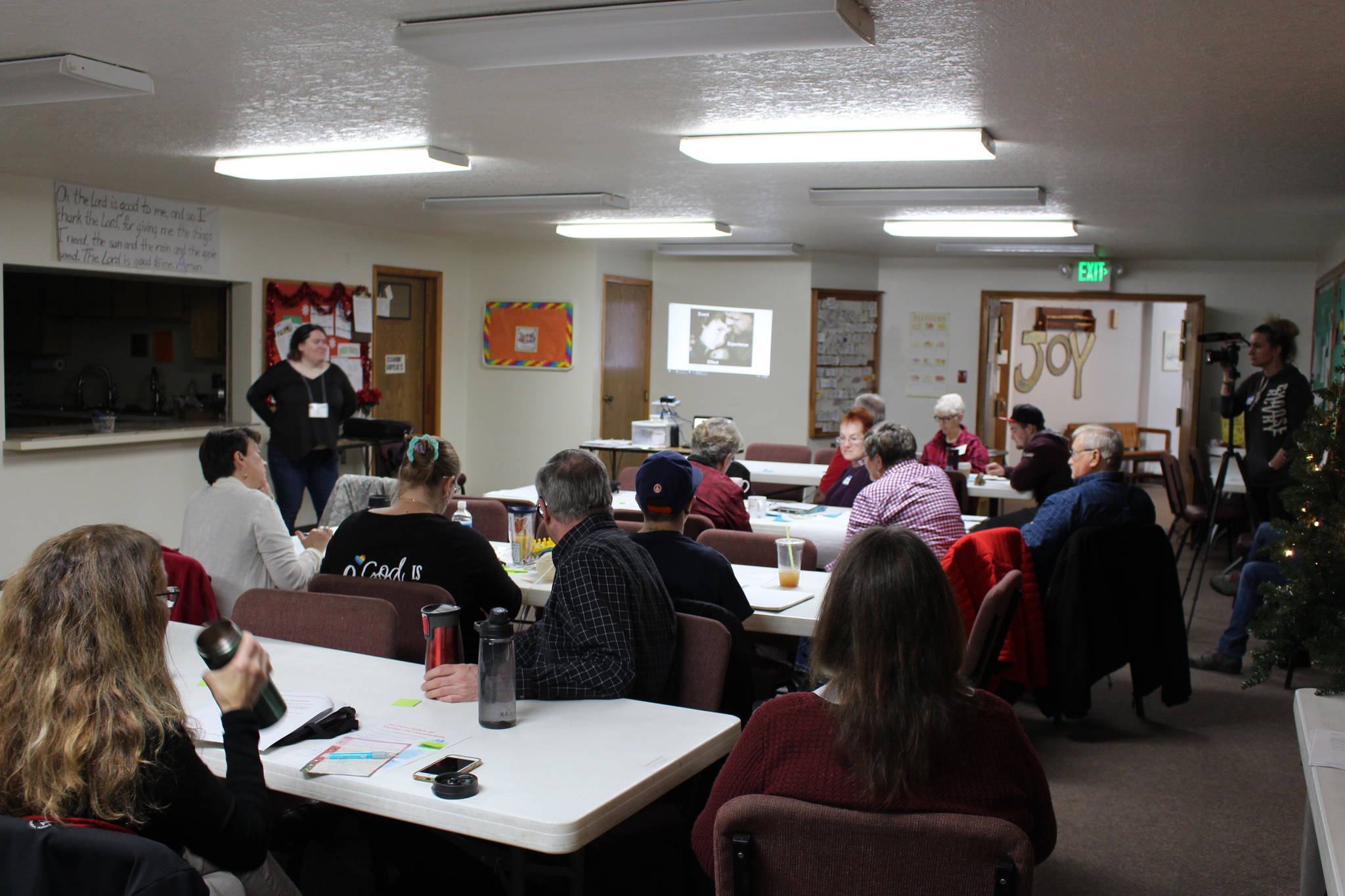Advocates are a few steps closer to developing an emergency cold-weather shelter on the Kenai Peninsula.
This weekend about a dozen volunteers participated in two days of training that prepared them with the skills and knowledge needed to staff an overnight shelter for homeless families on the peninsula. Friday’s training consisted of basic first aid, including CPR and naloxone administration, as well information on proper sanitation and biohazards. Leslie Rohr, executive director of Love, INC of the Kenai Peninsula, said that the CPR training was not the official certification course, but it did give volunteers the opportunity to practice on a dummy.
On Saturday Jodi Stuart, probation and parole officer with the Department of Corrections, conducted a training course on trauma-informed care.
The training provided was the same training given to criminal justice professionals and is certified by the Substance Abuse and Mental Health Services Administration (SAMHSA). Stuart is one of the only people on the peninsula who can offer this course. She said on Saturday that a lot of the lessons taught to those in law enforcement can be applied to those working at an overnight shelter.
“Often, individuals that are coming out of incarceration wind up in shelters, so there’s a direct correlation between the populations that we serve,” Stuart said. “I felt it was important to offer a legitimate training that this community can then use and be able to spread how trauma can affect many of our actions, the way we think and how we do things.”
Clayton Dempster was one of the volunteers at Saturday’s training and said he wanted to give back to the community because he has had some firsthand experience with both incarceration and living on the street.
Dempster said he was recently released from jail in Reno, Nevada, and has been staying at the men’s Freedom House in Soldotna — a faith-based recovery residence program — for the past few months.
“I was born and raised here, so I decided to come back here and kind of get my life together where it all started,” Dempster said. “I tried my own way for years, so I decided to surrender to God and just try to make myself available to him as he has always been available to me. Through doing that I feel like I want to try and help other people and just let God’s light shine through me.”
Dempster said that his own experiences have given him the ability to empathize with those he will be interacting with at the shelter and potentially help them improve their lives.
“I know what it’s like being lost and on drugs, and I feel drawn to people that are still suffering or might feel a little hopeless or stuck,” Dempster said. “Even just being there for them, giving them someone to talk to, and also being able to pray with them is important.”
Trauma-informed care — an approach used when interacting with vulnerable populations, including those experiencing homelessness and people who are incarcerated — recognizes the presence of trauma symptoms and acknowledges the role that trauma can play in people’s lives, according to SAMHSA’s definition.
The training on Saturday had the volunteers discussing what events or actions can be traumatic for individuals as well as how that trauma manifests itself in the behaviors of those affected by it. Throughout the course, Stuart emphasized the importance of recognizing that trauma is universal — meaning everyone is affected by it — and that the degree or severity of one person’s trauma does not minimize or negate the experiences of someone else.
One of the volunteers, Twyla Mundy, has experience with prison ministry and said that recognizing the universality of trauma is a crucial step in being able to help those who are homeless.
“We are a society of broken people,” Mundy said. “We are all traumatized, but not to the degree that some of us are.”
Mundy also said that even if problems arise during implementation of the shelter, just having one on the peninsula will go a long way.
“If we can open any kind of shelter at below 20 and there’s one person that’s warmer that night, that’s how we start,” Mundy said. “We’re not perfect, it’s not gonna work real well for a while, but we need to start stumbling because it may make the difference between life and death.”
On nights where the temperature in Kenai drops below 20 degrees Fahrenheit, the shelter will operate out of one of the churches that have agreed to participate in the program. Rohr said that a sixth church only recently came on board, and organizers are hoping to have a seventh church soon so that each can be assigned one day of the week. The shelter will require four volunteers to be awake from 7 p.m. to 7 a.m. and will include meals donated by the Kenai Peninsula Food Bank for dinner and breakfast. Rohr said that one of the most important parts of the shelter will be giving individuals and families the resources they need to start improving their lives after they leave in the morning.
“It’s not just going to be an in-and-out kind of deal,” Rohr said. “We want people to leave with a plan for the day and somewhere to go that will help them access whatever it is they need.”
Rohr said that if all goes according to plan, the shelter could be up and running by January.
The next shelter workgroup meeting will be Dec. 17 at noon at the Independent Living Center on Kalifornsky Beach Road. Anyone interested in volunteering can contact Rohr at leslie@peninsulaloveinc.org.

